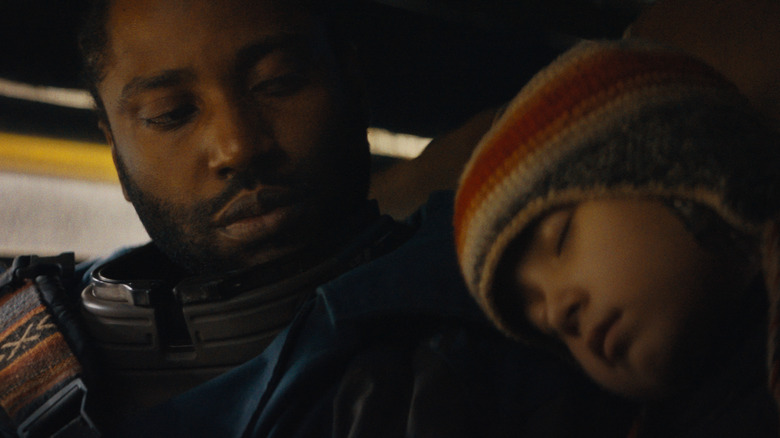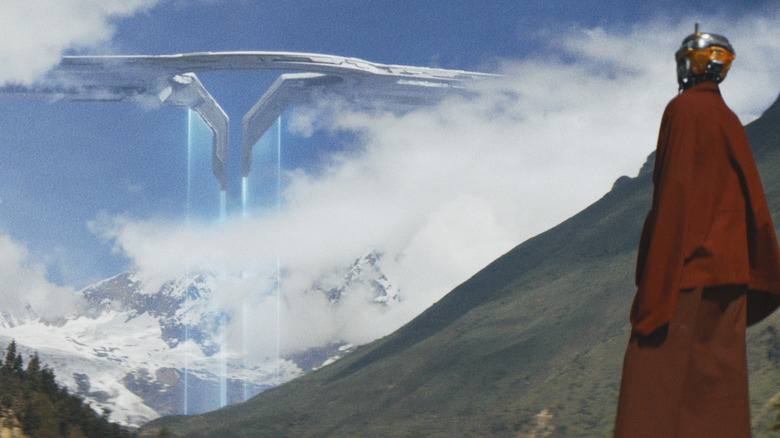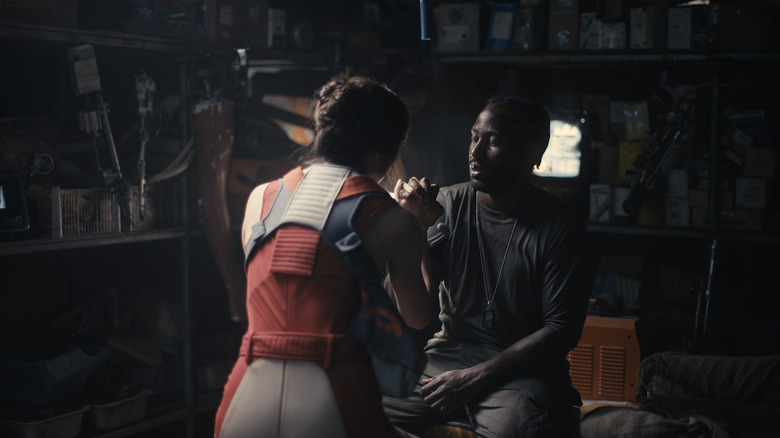The Creator Isn't Gareth Edwards Doing Star Wars Again – It's Gareth Edwards Doing Avatar
This article contains spoilers for "The Creator."
Gareth Edwards probably knew this would happen as soon as he started production on "The Creator." As with most directors who've stepped foot in the "Star Wars" sandbox — or even just flirted with doing so — a narrative emerged soon after the "Rogue One" filmmaker officially lined up his next project. An original sci-fi movie that seemed to share all sorts of thematic similarities with stories set in a certain galaxy located far, far away? Hmm, couldn't be a coincidence, right? Similar to Zack Snyder and his upcoming "Rebel Moon," which famously began as a "Star Wars" pitch before it was ultimately repurposed into an original script, many figured that this would be Edwards' chance to prove that the notorious behind-the-scenes shakeups on "Rogue One" were a fluke and that the talented filmmaker could now show off what he could do when freed from the shackles of an infamously hands-on studio. In short, "The Creator" had to be Edwards' true, authentic, unfiltered version of "Star Wars" ... right?
Well, after having actually watched "The Creator," it's clear that things are slightly less simple than that.
Don't get me wrong — there's plenty of evidence in Edwards' latest film that backs up the "Star Wars" angle of it all. From a band of scrappy rebels mounting a war for survival against imperialistic authorities to the looming threat of a Death Star-like instrument of destruction in humanity's airborne superweapon called NOMAD, the comparisons practically make themselves. But if another sci-fi blockbuster must be evoked when watching "The Creator," then it's clear that Edwards is following much more in the footsteps of a very different genre touchstone: James Cameron's "Avatar."
A mess of our own making
It's completely understandable why, even beyond Edwards' past history with the franchise, many would see his attempt to create a new and original sci-fi world about an epic war between the oppressed and their oppressors and immediately think of "Star Wars" ... but there's one key difference that makes "Avatar" a more apt comparison. While George Lucas always maintained that the Empire was an overt allegory for American intervention during the Vietnam War, there still remains a certain element of letting audiences off the hook. By not including any main protagonist struggling with actual ties or allegiances to the villains, it's easier for audiences to only ever think of the threat of fascism as some vague, faceless "other."
That couldn't be further from the case in James Cameron's 2009 blockbuster or "The Creator."
In both films, viewers have no choice but to follow a military man unquestionably working for the American bad guys, which is the conceit that allows each respective story to pack an additional punch. The framing of a main character who goes undercover among their enemy and eventually undergoes a profound change of heart might seem fairly standard (or even a bit trite), but give credit where it's due — that choice in both "Avatar" and "The Creator" speaks volumes about who, exactly, is primarily responsible for all the conflict inherent in both worlds. John David Washington's Joshua Taylor might not be cut from the exact same cloth as Sam Worthington's Jake Sully, but both function as reflections of our own culpability. Much like the colonizing humans in "Avatar," the NOMAD-wielding human invaders in "The Creator" draw a painfully clear line between the true good guys and bad ones.
Put another way: It's us, we're the problem.
A human touch
But is it really that straightforward? War-mongering humans bad, AI/aliens fighting for survival good? Thankfully, neither James Cameron nor Gareth Edwards leave it at that, which brings us to the other side of the coin.
Like "Avatar," "The Creator" goes out of its way to incorporate a love story in the middle of all the sweeping action. Although the relationship between Taylor and Maya (Gemma Chan) ends far more tragically than Jake and Neytiri's (Zoe Saldaña), Edwards spends precious amounts of screen time making this romance truly make an impression — both emotionally and thematically. Although Maya's status as merely another flesh-and-blood human robs this dynamic of some of its power (in another hypothetical draft of Edwards' and co-writer Chris Weitz's screenplay, maybe changing Maya to an actual Simulant would've made their forbidden love that much more meaningful), her staunch allegiance with the AI rebels over her own kind nevertheless adds another layer to the film's nuanced approach to the overall conflict. As befitting the director behind the most morally gray "Star Wars" film ever made (on the television side, Tony Gilroy's "Andor" proudly takes that crown, fittingly enough), adding this downright human touch to the AI cause in "The Creator" helps muddy the waters just enough to get general audiences to rethink their assumptions of villains and heroes.
In the end, "The Creator" probably lacks a tight enough script and a franchise-friendly ending to truly become either the next "Avatar" or the next "Star Wars," as some of us may have hoped. With that said, none can deny its ability to deliver the rarest thing these days — an original sci-fi epic with big ideas and even greater ambitions. James Cameron himself couldn't ask for anything more.
"The Creator" is now playing in theaters.


